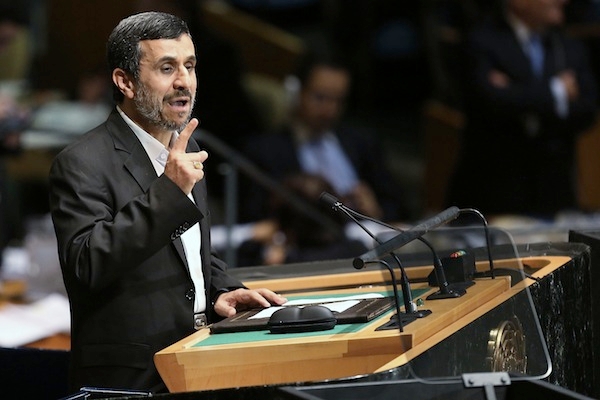In the course of a long career as a polemical journalist I have got thoroughly used to being insulted, libelled and attacked in a multitude of different ways. It comes with the territory, and is probably good for the soul. As a general rule the best policy is to allow these assaults to pass by outside the off-stump without playing a stroke. Disputes between journalists tend to be fruitless, self-important and (worst of all) tedious.
However, two weeks ago I published a book, co-authored with David Morrison, A Dangerous Delusion: Why the West is Wrong about Nuclear Iran. Since then my co-author and I have been subject to a series of misrepresentations and innuendo on a scale and (in some cases) virulence that I have never encountered before. In the circumstances there is no choice but to break the rule of a lifetime.
The first attack came from Oliver Kamm, a leader-writer on the Times. Under the headline ‘Peter Oborne’s co-author is a Srebrenica denier,’ Mr Kamm used his blog to accuse Dr Morrison of being a ‘sinister crank’, insinuating that he was even worse than a Holocaust denier, adding for good measure that he went around spreading ‘poison’.
This analysis was based on an article for the Labour & Trade Union Review in August 2005. I have read it carefully and do not find that it supports Mr Kamm’s interpretation, or anything like it. Indeed Dr Morrison explicitly stated in his article ‘that Bosnian Muslims got massacred in large numbers is not in doubt’ (a statement to which Mr Kamm did not draw his readers’ attention).
A week later and Mr Kamm was on the warpath again, repeating his attack on Dr Morrison and (as far as I can judge) suggesting that we had said that Ayatollah Khomeini has done more for religious freedom than Thomas Jefferson, something we hadn’t claimed. Once again, I felt it best to allow this one to drift by outside the off-stump.
Since then we have had two more attacks. One comes from an anonymous assailant (‘Media Hawk’) on The Commentator website and a second on Spectator Blogs and is written by Douglas Murray, a writer whom I slightly know. I disagree with Mr Murray about many subjects but (as I have told him) have respect for his bravery and integrity. His book, Bloody Sunday: Truths, Lies and the Saville Inquiry, is an excellent account of that very troubling business: particularly impressive because although Mr Murray writes from a unionist perspective, it is so very fair-minded.
And I can understand why Mr Murray has concluded (from listening to last week’s Telegraph podcast) that my co-author ‘appears to think’ that Iran’s President Ahmededinejad has not denied the Holocaust. However, I have listened to the tape again, spoken to Dr Morrison, and I am still certain that David was attempting – very foolishly – to be as accurate as he could about what he understood to be the facts, but in doing so he expressed himself clumsily. This painstaking attempt at honesty has unquestionably backfired and given rise to a lack of clarity about where he stands. For the record, David fully accepts that Mr Ahmedinejad denied the Holocaust.
A number of very unpleasant claims have been made against David Morrison in the last few weeks. If he was guilty of any of them I would not dream of having him as my co-author or calling him my friend. Meanwhile not one of our critics have even tried to deal with the central, factual points of our short book: that Iran isn’t in possession of nuclear weapons and isn’t building them; that the US and Israeli intelligence agencies don’t think they are; that Iran is entitled under the Non-Proliferation Treaty to develop peaceful nuclear power; that in 2005 it put proposals on the table to do this under full international scrutiny (including co-ownership).
We acknowledge that Iran’s human rights record – as Geoffrey Robertson has graphically portrayed in his recent book – is dreadful. We view President Ahmadinejad’s denials of the Holocaust as utterly odious. However, to judge Iran by Ahmadinejad alone would be a mistake. He steps down in a few weeks, and in any case the final decision on nuclear matters lies with the Supreme Leader, who has repeatedly denounced nuclear weapons as forbidden under Islam. It is in the best interest of the west, let alone ordinary Iranians whose lives are being made miserable by sanctions, to engage with Iran pragmatically rather than carry on with the current policy of isolation.
In the wake of June’s elections we hope and believe that a solution satisfactory to all parties can be agreed. We passionately believe that the alternative is too ghastly to contemplate. However, if an agreement is to be reached, we in the west need to recognize that Iran – with all its faults – is an independent nation with legitimate interests, and is a fully signed up member of the Non-Proliferation Treaty, with every right to enrich uranium.
We also need to be clear about the facts. This is why in our book we have attempted to expose the myths, falsehoods and delusions that surround this grave and troubling subject. There is an argument of massive importance to be engaged in here. If my critics wish to challenge me to open debate about the thesis of our book, I would be delighted to engage. They know how to get hold of me: any time, any place.
Read Rod Liddle’s thoughts on Peter Oborne’s new book in this week’s Spectator, out tomorrow. Click here to subscribe from just £1 a week.






Comments